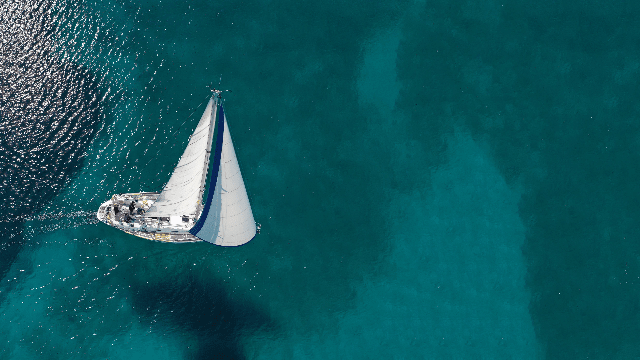Did you know? A surprising number of ESSEC Alumni are high-level skippers. Nine of them reveal the path that led them to the seas - and share some fascinating stories of their sailing adventures.
Élodie Sevestre (EXEC M06) on a course to the Athens Olympic Games
Élodie Sevestre (EXEC M06)
began sailing at the age of 5. ‘Ten years later, I started out as a “sandbag” on a Jod 35. From that moment on, I seized every opportunity to sail, on a funboard in La Baule, on a sport keelboat in Pornichet, in Glénans during the school holidays, and so on.’
Then one day, she met Yves Loday, tornado gold medallist at the Barcelona Olympic Games. “He allowed me to team up with him for several regattas with sports catamarans, then introduced me to coxswains who were looking for a crew member for the Athens Olympic Games.”
She thus began a three-year preparation alongside Anne Le Helley and Élodie Bertrand. “The most enriching experience of my entire life! Olympic sailing receives little media coverage and seriously lacks in funding. The French Sailing Federation contributed to travel expenses only and provided us with a coach. For everything else, and in particular the transport of our 600kg keelboat across Europe, we had to manage by ourselves.” An adventure from a sporting and managerial perspective alike. “It’s important to agree on the common goals such as the destination or the result to achieve, to acknowledge that a chief skipper will have the final say when a difficult decision is to be made, to allocate roles at sea and on land according to each person’s skills and qualities, and to make sure information passes correctly between all players to ensure smooth sailing. Most of our opponents failed due to communication issues. We strove to manage our vessel like a small company.”
Those efforts paid off. “We finished 5th at the 2004 Games.” Élodie decided not to pursue the venture, however. “I had to train with a Yngling, a boat I don’t enjoy handling. On top of that I had other career ambitions.”
She continues nevertheless to sail will her family. “My strongest memory was during a 5-month trip between the south of France and the Cape Verde Islands, when our genoa halyard broke. While my husband and I were struggling to hoist the soaked sail up again, which weighs more than 80kg when dry, my 9-year-old daughter put on her life-jacket, took the helm and steered us into the wind. Sailing is always full of surprises!”
David Sineau (E96), at the helm of Initiatives-Cœur
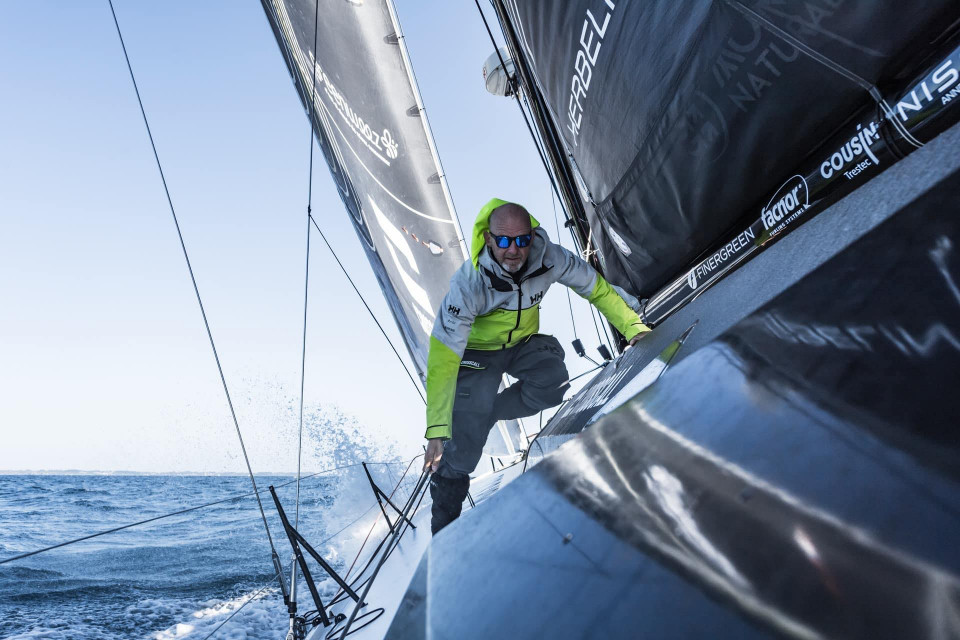
David Sineau (E96) may have grown up far from the coast, but he still managed to brave the sea from an early age. “I spent all my summers in Sables d’Olonne, on a 470, or windsurfing. When I started at ESSEC, I took up racing more seriously, with winter training, the Spi Ouest France, university races and sailing trips with friends to islands, along the Atlantic coast, the Mediterranean or around Ireland.”
As soon as he started to make a living, he invested in a boat and moved to Saint-Malo to prepare for the Mini Transat. “I saw this as the adventure of a lifetime and felt humbled before my opponents, who were often born and raised by the sea. As of my first attempt, I managed to come in among the winners however, having stayed in the lead for much of the race.”
He repeated the experience in 2007, this time earning second place in the prototype category. “I met a great number of renowned and up-and-coming skippers during this edition, such as Adrien Hardy, Sam Manuard, Thomas Ruyant, Isabelle Joschke, or Alex Pella.”
He thus forged valuable ties with the world of ocean racing, which led him to take part in the Solitaire du Figaro in 2011 and 2012, and the 2021 Transat Jacques Vabre, with two-time world freeride ski champion Aurélien Ducroz. He also developed the Initiatives-Cœur project with Tanguy de Lamotte. “We charter a yacht in major ocean races (Vendée Globe, Route du Rhum, etc.) with Samantha Davies at the helm, to raise funds for the charity organisation Mécénat Chirurgie Cardiaque, which enables children with heart defects from disadvantaged countries to have surgery in France.”
Patrick Losq (E88), from wind-surfing to sailing

Patrick Losq (E88) is a born seafarer. “My father was a professional sailor and I lived in several ports in Brittany.”
His first love was windsurfing and the French shapers who create cutting-edge equipment. “France is known for its high proportion of windsurfers and its innovations in this field.”
As of 2000, he devoted his time to sailing in a stricter sense. “Having started with a Class 8, I acquired my first yacht with a view to entering a Mini Transat.” Numerous others were to follow. “With the fifth, a Class 40 capable of circumnavigating the globe, I spent 3 years preparing for the legendary Route du Rhum. 6 months before the race, however, my trusty vessel, docked on a quay in Le Havre, was damaged in a 63-knot gale, which left a 6-metre gash. I had to resign myself to moving my yacht to Brittany to offer it a second, more sedate life in fast cruising.”
Patrick can still hear the seas calling, however. “I’m looking for a boat to start racing again.” The ocean offers him unique sensations and experiences. “One January morning, at dawn, I was sailing towards the Atlantic coast, alone but for the company of dolphins, when I passed a cruise liner heading to England. In the dip of the waves, its 5 decks disappeared completely only to reappear on the next crest...it took that sight for me to realise the extreme swell I was sailing on!”
Cédric Baecher (E00), crossing the Atlantic with a team
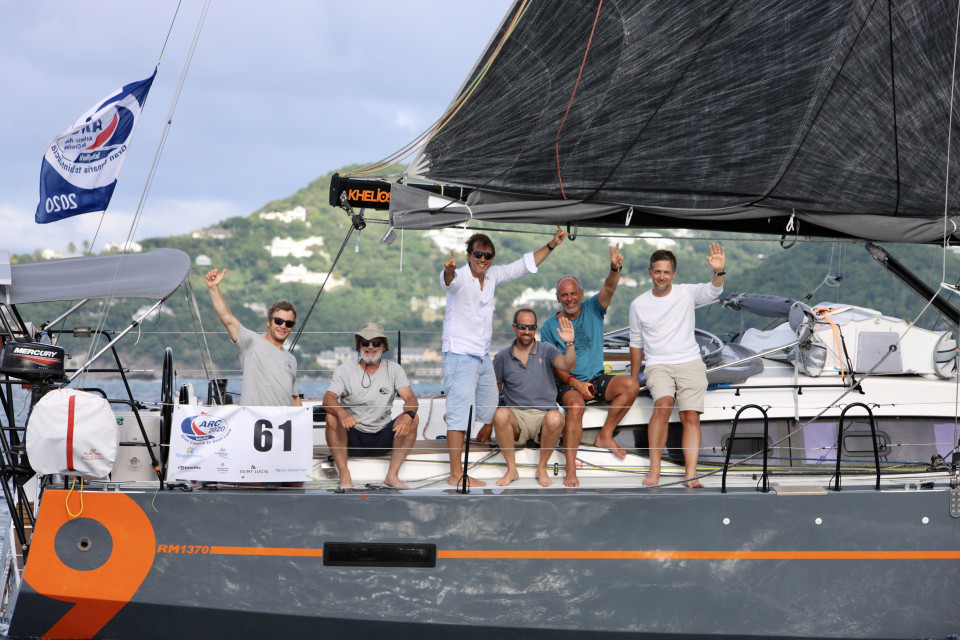
A former member of the ESSEC Sailing Club, Cédric Baecher (E00) had dreamt of crossing the Atlantic for 30 years. “In 2020, I finally took the plunge and formed an amateur crew to enter the Atlantic Rally for Cruisers, an annual event which attracts 1,200 participants and several hundred boats.” The project almost capsized on several occasions. “To begin with, the COVID-19 pandemic almost put a stop to things. Then 3 weeks before the start of the race, our catamaran had an accident in the Bay of Biscay. Luckily, we came up with a plan B.” Manned by the professional skipper Nicolas Boidevezi, the crew of six, including Grégory Louard (E00), set off for an 18-day, 3,000-mile journey from Las Palmas to Saint Lucia. “And against all the odds, we won the competition in our category.”
The adventure was a highly-formative experience. “For me, this was above all an immense lesson in humility, endurance and resilience in the face of the elements and raw nature, which can be extraordinary and sometimes terrifying. Throughout the adventure, from the preparation to the crossing, I also observed several connections with management and running complex projects: motivation and engagement around a base of common values, detailed planning, collaboration in the face of adversity, the definition and upholding of successful leadership, and decision-making in moments of uncertainty.” He is particularly proud to “have succeeded with a mixed group, a hybrid team in terms of age (40 to 70) and initial skills (from novice to expert).”
Pauline Darde (E13), a sabbatical year on the Atlantic Ocean
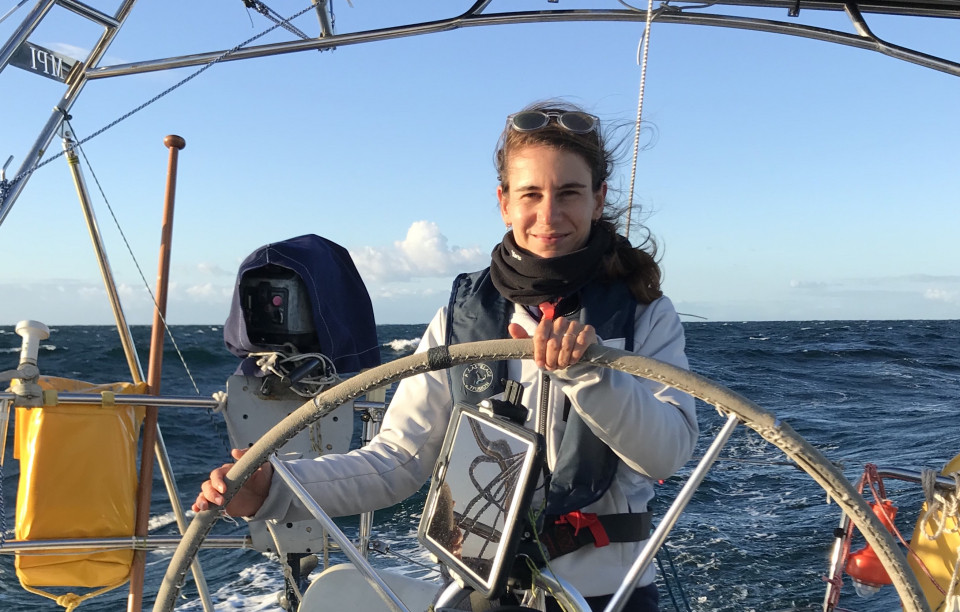
Pauline Darde (E13) and her partner are accomplished sailors. “We decided to sail away on a sabbatical year together, following several years’ experience as sailing instructors in Glénans. We’d never sailed the ocean, however, with night shifts on a reduced team!
The couple initially hoped to sail around the world. “We hadn’t banked on the distances and our desire to take the time to travel. In the end, we decided to cross the North Atlantic with a First 38S5. We set sail from Dunkirk, headed to the south of England and the Scilly Isles, along the coast of Brittany, explored the coastlines of Galicia and Portugal, and then the islands: beautiful Madeira, the incredible Canaries, and the unique Cape Verde. Finally, after 3 months in the Caribbean (the Grenadines, Martinique and Guadeloupe), we returned to France via the Azores.
They have countless striking memories of their trip. “Our electricity broke down in the middle of the Atlantic, we suffered a string of hurdles forcing us to shift from 5 to 40 knots every half-hour, managed a co-crew member on the return crossing, who, in the grip of panic and imagining shipwreck or running out of supplies, asked us to turn around 8 days out of Guadeloupe…but we also sailed for a whole night in perfect harmony under a shower of shooting stars, escorted by dolphins; we caught a dolphinfish measuring 1m20, and also came across a huge fin whale in the Canaries, which emerged just 2 metres from us, signalling its presence with a loud blow!”
A unique experience which marked a milestone in Pauline Darde’s life. “The immersion in the heart of nature and the appropriation of the slowness inherent to sailing forged a deep connection in me to the beauty and fragility of our planet. Seeing the whitened corals, unbalanced ecosystems or the plastic pollution in the middle of the sea and along the coast were strong incentives for me to train and set up my own business to support ecological transition and the shift to a circular economy in companies and regional communities.”
Arthur Peugeot (E19), Alice Lasseigne (E18), Victoire Martinet (E17) and Alexandra Lucas (M21), embark on the 2023 Mini Transat
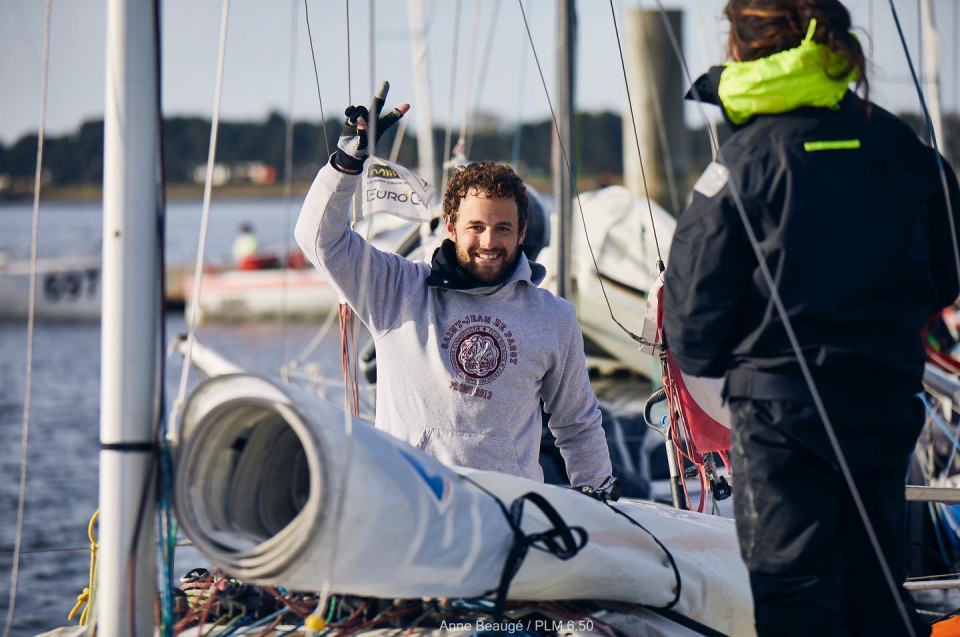
By sheer coincidence, but an illustration of the strong ties between ESSEC Alumni and the sea, no less than 4 alumni are currently preparing to embark on the 2023 edition of the Mini Transat. Arthur Peugeot (E19) tells us: “This is a race to cross the Atlantic single-handedly on small 6.5-metre yachts. There is nothing mini about the crossing itself, you have to sail from Sables-d’Olonne to Guadeloupe, via the Canary Islands, in just one month. Another specificity of this race is that competitors set off with neither means of communication with the outside world nor digital mapping. Many skippers consider this race to be one of the most difficult in the world.”
Yet Arthur is not a professional skipper. “Before this project, I’d only done some day courses with a light yacht, taken friends for a sail, and participated in 2 or 3 day-long regattas with a team.” To meet the qualification requirements for the Mini Transat, he had to take things up a notch. “Over the past year I’ve done 6 double-handed and single-handed regattas on my boat, and completed a round trip to Ireland in 9 days.” Not without a few scares... “After 3 days of racing south of Brittany in rough seas, I sailed under the Île de Ré bridge at around 2 in the morning. Despite the wind, my yacht suddenly stalled for no apparent reason. It took me a while to realise that a huge clump of seaweed had knotted around the keel. I had two options, either to continue at a snail’s pace (and be disqualified) or dive in to pull away the seaweed (and face one of my worst fears). I ended up jumping into the water in underpants and trainers, with a headlamp, a knife, and a harness around my hips. It took 4 or 5 attempts to free the boat. I’ll remember my victory dance, completely naked in the warmth of the rising sun, for a long time to come!”
A test heralding the challenges he would face during the Mini Transat. “How do I climb to the top of my mast by myself? How do I interpret the weather data sent once a day by radio? How do I repair the hull or the on-board electronics if there’s a problem?” Not to mention the deleterious combination of solitude and lack of sleep. “Once at sea, you can only sleep in short 20-minute naps, whenever you get a chance, during the day or night, with the help of an auto-pilot to avoid collisions and other unwelcome surprises. Little by little, exhaustion gnaws at your spirit and amplifies your emotions. This is so much more difficult to manage when you have no-one to talk or vent to. You end up in a state of affective claustrophobia, exhausted in your nutshell.”
So why expose himself to such dangers? “The dream of adventure, to exceed at a sport, a competitive spirit and a love of physical labour...there are lots of motivations.” You certainly have to be motivated to take up a challenge of this kind. “In fact, the actual sailing represents a relatively minor part of the whole venture; you also need to devote time to technical learning, physical and mental preparation, administrative procedures and the hunt for financial partners. Speaking of which, if you’d like to fly your company’s flag alongside a human and entrepreneurial adventure, and rally your customers around strong values, don’t hesitate to contact me!”
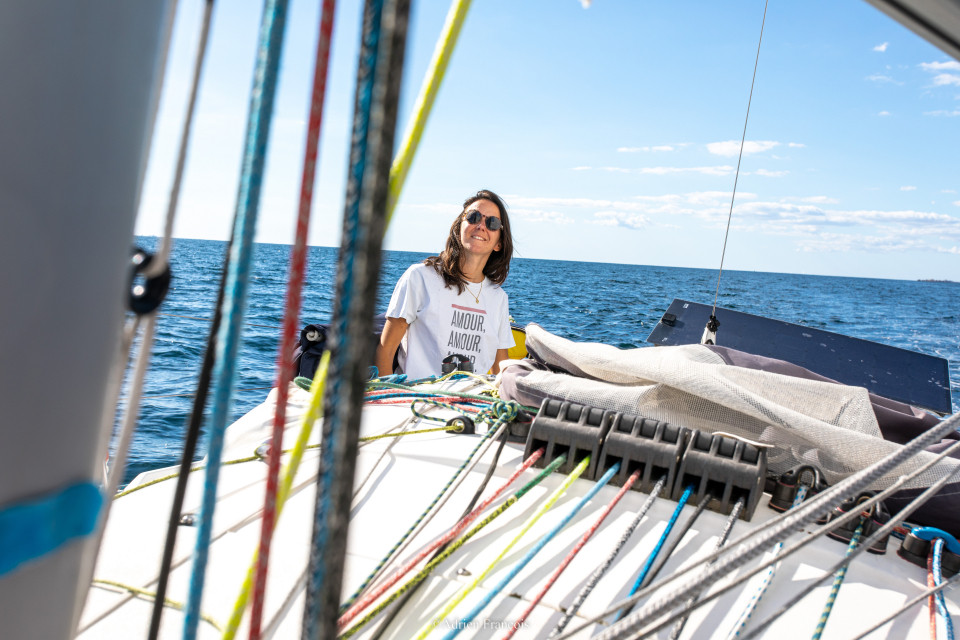
Alice Lasseigne (E18) is also preparing for the 2023 Mini Transat. She admits that “it’s a huge challenge, especially given that I learnt to sail relatively late, during my studies. As vice-president of the Centrale Sailing Club, I took part in regattas with classmates from all over France, in Le Havre, Trinité sur Mer, Pornichet, or Marseille and so on.” Ocean racing represents a real change of scene. “I recently experienced my first storm at sea, alone, as the night was falling. The clouds darkened, the wind began to rise and I realised I had no idea of the right things to do. Should I drop anchor? Unplug the electronic equipment? I was afraid the mast would attract the lightning. Around me, other competitors were disappearing one after the other from the radar, probably because they were shutting down their batteries. In the end I thought it was best to reduce the sails and leave everything on, to be able to communicate by VHF radio and remain visible. After a few hours, I came out unscathed. And once back on dry land, I learnt that no, masts do not especially attract lightning!” If Alice feels the need to perfect her expertise as a skipper, she can rely on her managerial skills. “The Mini Transat is truly an entrepreneurial venture, with programme and budget steering, risk management, accounting, communication, partner relations and capital raising. While we’re on that subject, a word to the wise… I’m still looking for sponsors!”
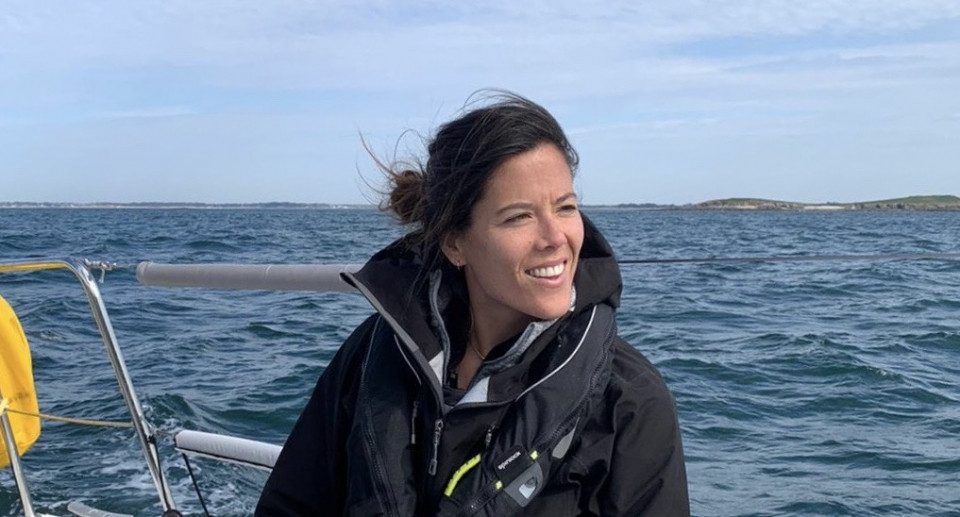
For Victoire Martinet (E17), the Mini Transat is a new chapter in a long love affair with the sea. “Water sports have been an inherent part of my life since my childhood spent by the sea. After years of wind-surfing I discovered yachting during my studies, through regattas and sailing trips. I was even vice-president of the ESSEC Sailing Club, and proudly donned the yellow boots for the EDHEC Cruise with an all-woman crew from the club.
She has been training on a regular basis for the last year on a boat she bought, taking part in regattas or off-races, single- or double-handed, day and night. “I was particularly lucky to take part in an amazing race, a return trip between France and the Azores archipelago off the coast of Portugal. I was so proud to make it to the finish, because I really wasn’t sure of myself when I first set sail! Arriving at Horta was an especially moving moment for me, after 11 days alone at sea, to be welcomed by whales in the middle of a volcanic landscape.”
Not a single pitfall seems to have hampered her course to the Mini Transat. “Between meteorology, electronics or seamanship, you are constantly learning. Not to mention the search for funding, with an operational budget of around €100,000 over 3 years, you need to surround yourself with sponsors. There’s still some room on board!”
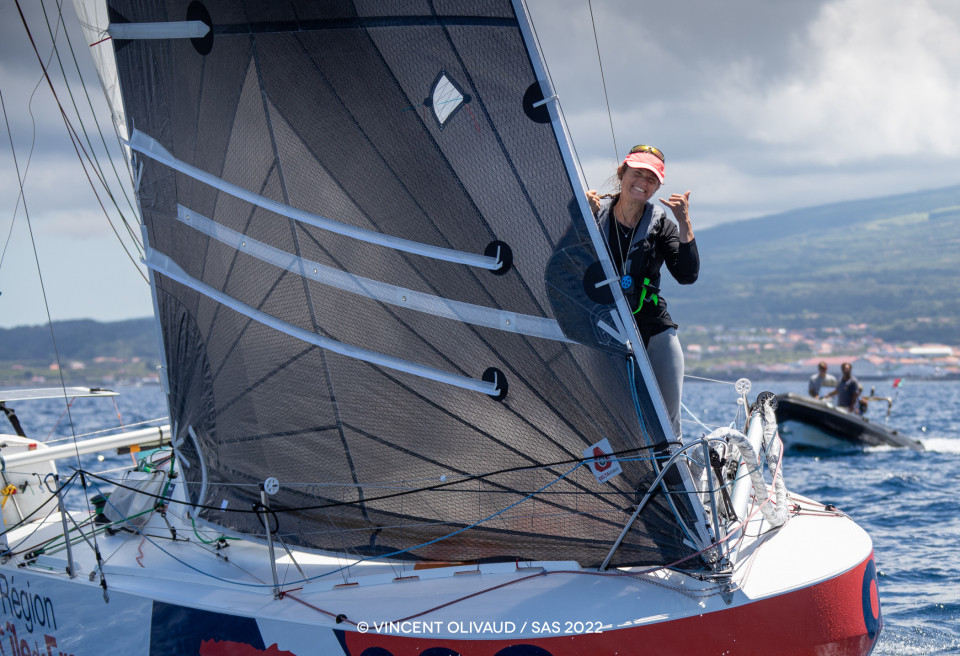
Paris-born Alexandra Lucas (M21) discovered sailing at a later age of 28. “A friend invited me to accompany him on a regatta in the Calanques, followed by the Rolex Cup, and the Voiles de Saint Tropez… I wasn’t much use except for manning the sail and ballasting, but I loved it.” She repeated the experience several years in a row, and began to venture into the open sea. Inspired by another friend, she finally bought a Maxi 6’50 in 2018 to prepare for the Mini Transat.
The beginnings were laborious. “I really didn’t know how to sail. I didn’t even know what a runner was.” Discouragement loomed on the horizon, especially when COVID-19 interrupted her training sessions. “Thankfully, a cousin helped to restore my motivation by explaining that the journey is more important than the finish.”
At present, she travels from Paris to Lorient every 2 weeks and has clocked up several single- and double-handed races. “The MiniGascogna from Port-Bourgenay to Getxo in Spain, the PLM Lorient, the Pornichet Sélect between Belle-Île, l’Île d’Yeu, Sables d’Olonne and Groix, the Fastnet from Douarnenez to Ireland, and others, not forgetting a 1,000-mile (1,850 km) off-race between Lorient, Ireland and Île de Ré. I crossed the Channel twice, despite the rough weather, a torn spinnaker I had to repair in an emergency, and solar panels that stopped charging my batteries, forcing me to take the helm for long hours at a time.”
Her most remarkable and formative experience, however, was her participation in the SAS in the summer of 2022. “An incredible return trip between France and the Azores archipelago, which amounts to crossing a third of the Atlantic. A race against other competitors and oneself; I felt so lonely that I would chat to the cargo ships I passed from time to time! It was also a race against the elements. Cape Finisterre was true to its reputation, with a lot of wind and waves, or the Azores anticyclone with its endless calm. And if that wasn’t enough, my aerial broke down and left me without wind and steering information. I had to climb 12 metres up the mast to repair it, attached to a 6-metre halyard and buffeted like a marble in a bowl by the swell. My first attempt failed, I was scared stiff, in tears, stuck at the second spreaders. I spent two days at the helm before working up the courage to try again. This time, I was more successful.”
Her trials were rewarded by a spectacular arrival, between volcanoes, dramatic cliffs, dolphins and the lessons learnt. “I’m facing this adventure as though it were an entrepreneurial project, which helps me to develop the skills I also need to launch my start-up, Shape the World, a recruitment platform geared towards jobs in energy, environmental and social transition. For example, searching for sponsors has taught me to pitch. A message for ESSEC alumni: I’m still looking for partners to join me alongside the Île-de-France regional authority!”
Interview by Louis Armengaud Wurmser (E10), Content Manager at ESSEC Alumni.
Want more content? Join us now so that we can keep bringing you news about the ESSEC network.

Comments0
Please log in to see or add a comment
Suggested Articles


